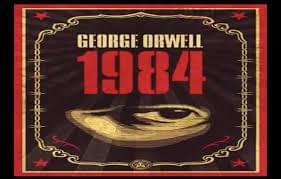
'1984' by George Orwell
Reading the book today, whilst keeping in mind what 1948 looked like, I wonder how much you will consider Orwell got right in his predictions of society's progress.
This book is a warning for the future, and, alongside demonstrating a refined English, will get young readers thinking about social progress, government and security.
Read on below for our study guide!
Program of Reading
Week 1 - | Book I |
Week 2 - | Book II: Chapters I-V |
Week 3 - | Book II: Chapters VI-X |
Week 4 - | Book III & Appendix |
|
| ||||||||||||||
Parsons | a neighbor and family man who lives near Winston and works in the Ministry; fat and obnoxious |
Emmanuel Goldstein | the legendary leader of the Brotherhood - a group of revolutionaries against the Party; vilified by the Party as the most dangerous man in Oceania |
Key Themes
The Dangers of Totalitarianism | Orwell was shocked by the abuses of power and atrocities committed by the Soviet Union, and other contemporary totalitarian regimes. He was particularly worried about the role of technology in enabling oppressive governments to maintain control through surveillance. |
Control | The Party maintains absolute control and 'stability' in '1984' through various means. Look out for the forms of psychological, physical, and intellectual control of the regime which permeate society to the point that everything - from bodies, to minds, to history and thought - are completely determined by the government. |
Language | Language in '1984' is represented as something which determines subjects, so that it can act as a form of mind control, determining reality and eradicating the possibility of resistance. 'Newspeak' is the means by which the Party mould language and should be looked at carefully. |
Independence & Identity | A common idea in dystopian novels, the citizens of Oceania have little to no independence, nor any sense of identity as separate from the social body. Winston has no idea of his own history; personal loving relationships are forbidden; and uniqueness is something revolutionary. Winston attempts to be independent, writing a diary to create a sense of identity, and seeking a sexual relationship with Julia, and his level of success is something to be seen... |
|
Questions to ponder...
- How much was Orwell right in his predictions about the future?
- What role do the symbols of the glass paperweight and the church of St. Clement play in 1984?
- Compare and contrast the revolutionary attitudes of Winston and Julia.
- Lots of Orwell's vocabulary in 1984 has been integrated into language today (Big Brother, Thought Police, etc.). Explore modern usages of these terms today; have they kept their original meaning from the novel, or have they changed? Why do you think new meanings might have been taken on by these phrases?
- Discuss the role of Doublethink in the novel. Can you find any evidence of something similar in modern society?
- To what extent is '1984' a fatalist novel, and to what extent optimistic? Take into particular account the novel's appendix.




